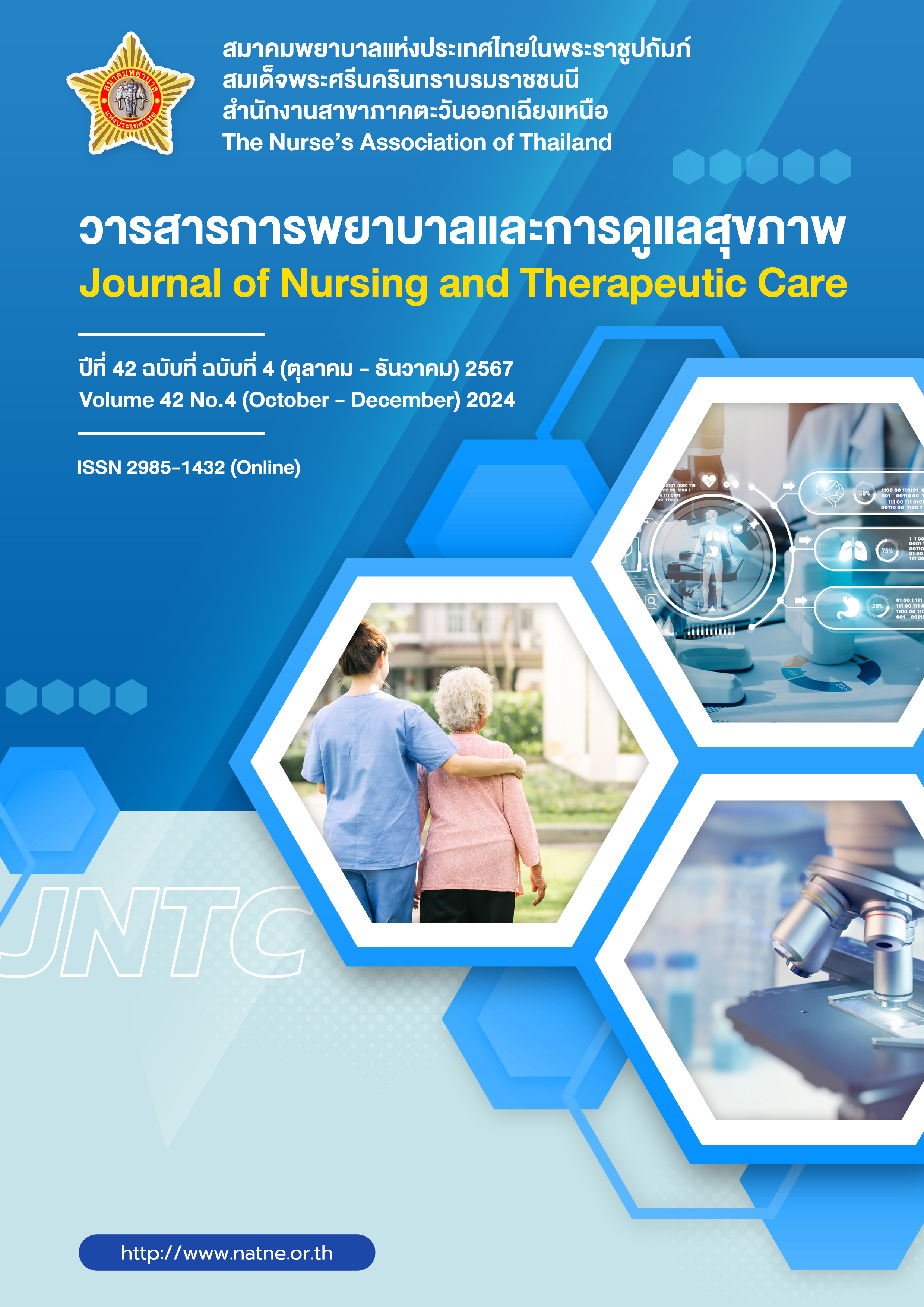ปัจจัยที่มีอิทธิพลต่อผลสัมฤทธิ์ทางการเรียนของนักศึกษาพยาบาลศาสตร์ ชั้นปีที่ 1 จากการเรียนการสอนรูปแบบ Cloud University รายวิชากายวิภาคศาสตร์และสรีรวิทยา
คำสำคัญ:
ผลสัมฤทธิ์ทางการเรียน, การสอนรูปแบบ Cloud university, รายวิชาวิภาคศาสตร์และสรีรวิทยาบทคัดย่อ
การเรียนการสอนแบบ Cloud University เป็นการเรียนที่จำเป็นต้องใช้เทคโนโลยีสมัยใหม่ ผู้เรียนสามารถเรียนรู้ด้วยตนเองซึ่งเป็นกระบวนการที่ผู้เรียนวิเคราะห์ความต้องการการเรียนรู้ กำหนด เป้าหมาย แสวงหาความรู้ และประเมินผลการเรียนรู้ด้วยตนเอง การวิจัยเพื่อหาความสัมพันธ์เชิงทำนายนี้ มีวัตถุประสงค์เพื่อศึกษาปัจจัยที่มีอิทธิพลต่อผลสัมฤทธิ์ทางการเรียนของนักศึกษาพยาบาลศาสตร์ ชั้นปีที่ 1 จากการเรียนการสอนรูปแบบ Cloud university รายวิชากายวิภาคศาสตร์และสรีรวิทยา ประชากรที่ศึกษา คือ นักศึกษาพยาบาล ชั้นปีที่ 1 สุ่มกลุ่มตัวอย่างอย่างง่าย กลุ่มตัวอย่างตอบแบบสอบถามสมบูรณ์ 137 คน เครื่องมือที่ใช้เป็นแบบสอบถามออนไลน์ มีระดับการวัดเป็นมาตรประเมินค่า 5 ระดับ ตรวจสอบด้วยผู้ทรงคุณวุฒิ 3 ท่าน มีค่าความตรงระหว่าง 0.67 – 1.00 และค่าความเชื่อมั่น 0.99 สถิติที่ใช้ คือ สถิติเชิงพรรณนา และสถิติถดถอยพหุคูณแบบหลายขั้นตอน
ผลการวิจัยพบว่า ด้านปัจจัยด้านผู้เรียนและด้านสิ่งสนับสนุนการเรียนรู้มีค่าเฉลี่ยอยู่ในระดับปานกลางส่วนปัจจัยด้านผู้สอน และด้านการวัดประเมินมีค่าเฉลี่ยอยู่ในระดับมาก เมื่อวิเคราะห์ปัจจัยที่มีอิทธิพลต่อผลสัมฤทธิ์ทางการเรียนของนักศึกษาพยาบาลศาสตร์ ชั้นปีที่ 1 จากการเรียนการสอนรูปแบบ Cloud university รายวิชากายวิภาคศาสตร์และสรีรวิทยา คือ ปัจจัยผู้เรียน สามารถร่วมกันทำนายได้ร้อยละ 21.40 ฉะนั้น ควรมีการเตรียมความพร้อมอุปกรณ์ในการเรียนออนไลน์ให้กับนักศึกษาก่อนเข้าศึกษาเพื่อให้นักศึกษามีความมั่นใจในการเรียนออนไลน์
Downloads
เอกสารอ้างอิง
Armbrust M, Fox A, Griffith R, Joseph AD, Katz R, Konwinski RA, et al. A view of cloud computing. ACM Journals. 2010;53(4):50-8.
Panich V. Ways to create learning for students in the 21st century. Bangkok: Sodsri-Saridwong Foundation; 2012. (in Thai)
Boromarajonani College of Nursing Nakhon Si Thammarat. Bachelor of nursing science program, 2023. Faculty of Nursing, Praboromarajchanok Institute; 2023. (in Thai)
Uttra S, Taengphukieo R. To-on P. Self-assessment report measurement model for online learning during the COVID-19 pandemic. Journal of Humanities and Social Sciences Mahasarakham University 2023;42(4):632-46. (in Thai).
Alibak M, Talebi H, Neshat-Doost HT. Development and validation of a test anxiety inventory for online learning students. J Educ Online. 2019;16:16.
Saraburi G, Yeam G. Students’ attitudes towards e-learning and behavior of students due to use moodle program and the conclusions were that the students had attitudes towards online education at a good level and were willing to use online education at a good level. In: Rungsawanpoo D, editor. The 7th Aoademlo Metting National and International Conference; 2016 June 10; Suan Sunandha Rajabhat University, Bangkok; 2016;7(3):1-9. (in Thai)
Sabthanadon T. Factors affecting the teaching and learning management of online lessons at Nakhon Ratchasima Rajabhat University. Veridian E-Journal SU. 2011;4(1):652-63. (in Thai)
Wayo W, Charoennukul A, Kankaynat C, Konyai J. Online learning under the COVID-19 epidemic: concepts and applications of teaching and learning management. Regional Health Promotion Center 9 Journal. 2022;14(34):285-98. (in Thai)
Lamcahona T, Klinhom T, Thongdonngaw N, Sriruang L, Pradit R. Factors affect the achievement of online learning, case study: Phibunsongkhram Rajabhat University. Academy Journal of Northern. 2022;9(1):54-68. (in Thai)
Adithepsathit T, Adithepsathit U. Relationship between attitudes towards online learning and English learning achievement among students at Prince of Songkla University, Surat Thani Campus. Journal of Industrial Education. 2023;22(1):88-98. (in Thai)
Faul F, Erdfelder E, Lang AG, Buchner A. G*power 3: a flexible statistical power analysis program for the social, behavioral, and biomedical sciences. Behav Res Methods. 2007;39(2):175-91.
Cohen J. Statistical power analysis for the behavioral sciences. (2ed). Hillsdale, NJ: Lawrence Erlbaum Associates; 1998.
Artiwitchayanon A, Srisopa P, Wacharasin C. Factors predicting nursing students’ learning outcomes through online learning during COVID-19 pandemic. Songklanagarind Journal of Nursing. 2022;42(2):85-97. (in Thai).
Best JW. Research in education. (3ed). Englewod Cliffs: Prentice-hall. 1981.
Niratechaphat W. Online study problems in higher education students. Journal of Humanities and Social Sciences Nakhonratchasima Rajabhat University. 2022;2(2):75-87. (in Thai)
Sawangsri B, Gerdpanya P. Study of the effectiveness of online learning and the academic achievement of undergraduate students. RMUTSB Acad J (Humanities and Social Sciences). 2021;6(2):273-90. (in Thai)
Jantakeeree T. Online instructional management in the digital era. Journal of Modern Learning Development. 2022;7(10):349-63. (in Thai)
Pakdeeteva S, Bangthamai E. New era learning and online instruction in higher education institutions. Sukhothai Thammathirat Open University Journal. 2021;34(1):1-18. (in Thai)
Uttra S, Taengphukieo R. Factors influencing midterm achievement and psychological motivation for online learning using multiple regression analysis. Kalasin University Journal of Humanities Social Sciences and Innovation. 2024;3(1):97-111. (in Thai).
Yuktananda T. A study of factors affecting the achievement of online learning of students under the spread of the COVID-19 virus. Journal of MCU Peace Studies. 2022;10(2):509-22. (in Thai)
ดาวน์โหลด
เผยแพร่แล้ว
รูปแบบการอ้างอิง
ฉบับ
ประเภทบทความ
สัญญาอนุญาต
ลิขสิทธิ์ (c) 2024 วารสารการพยาบาลและการดูแลสุขภาพ

อนุญาตภายใต้เงื่อนไข Creative Commons Attribution-NonCommercial-NoDerivatives 4.0 International License.



